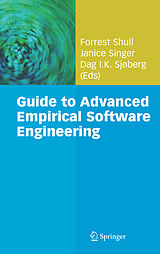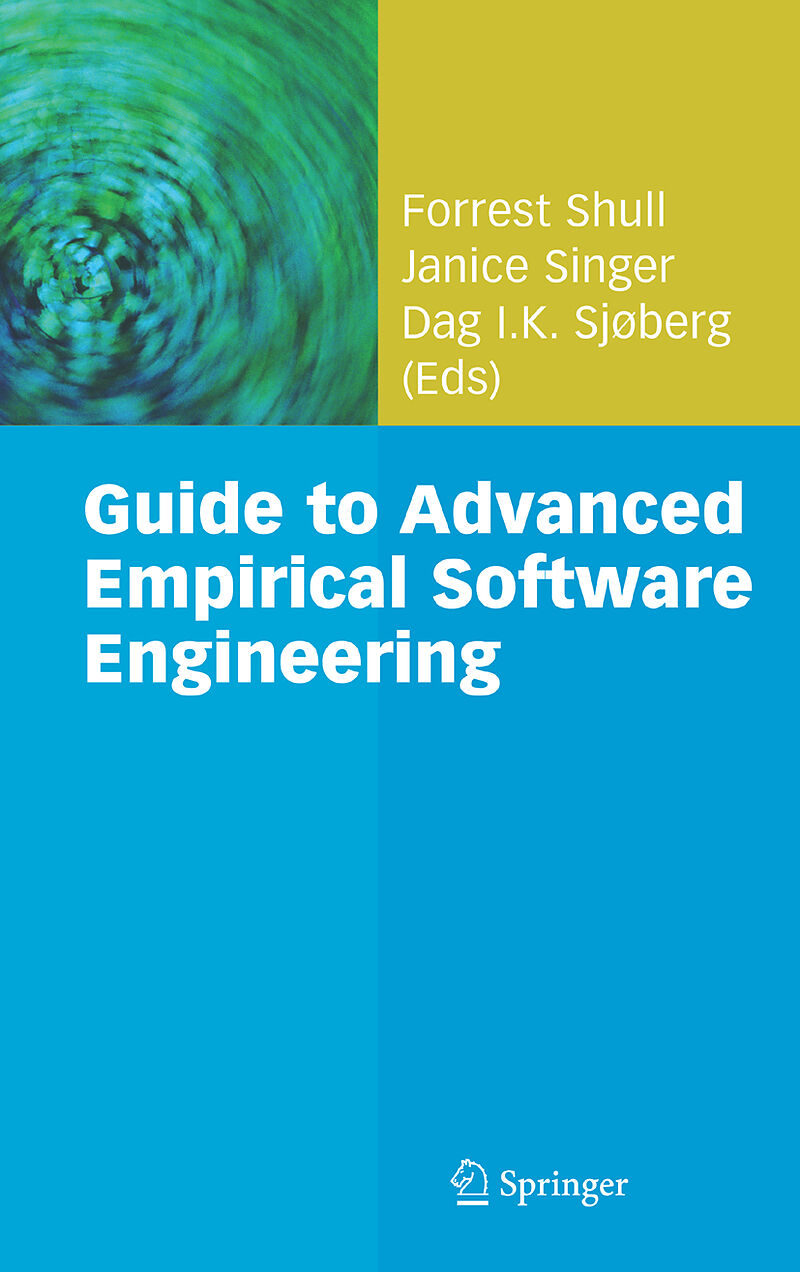Guide to Advanced Empirical Software Engineering
Einband:
Fester Einband
EAN:
9781848000438
Untertitel:
Englisch
Genre:
Informatik
Herausgeber:
Springer-Verlag GmbH
Auflage:
2008 edition
Anzahl Seiten:
388
Erscheinungsdatum:
2007
ISBN:
978-1-84800-043-8
Empirical studies have become an important part of software engineering research and practice. Ten years ago, it was rare to see a conference or journal article about a software development tool or process that had empirical data to back up the claims. Today, in contrast, it is becoming more and more common that software engineering conferences and journals are not only publishing, but eliciting, articles that describe a study or evaluation. Moreover, a very successful conference (International Symposium on Empirical Software Engineering and Measurement), journal (Empirical Software Engineering), and organization (International Software Engineering Research Network) have all evolved in the last 10 years that focus solely on this area. As a further illustration of the growth of empirical software engineering, a search in the articles of 10 software engineering journals showed that the proportion of articles that used the term empirical software engineering d- bled from about 6% in 1997 to about 12% in 2006. While empirical software engineering has seen such substantial growth, there is not yet a reference book that describes advanced techniques for running studies and their application. This book aims to fill that gap. The chapters are written by some of the top international empirical software engineering researchers and focus on the practical knowledge necessary for conducting, reporting, and using empirical methods in software engineering. The book is intended to serve as a standard reference.
To-date there has been no advanced material geared towards new researchers and graduates this book fills this gap Offers an extensive toolkit of techniques, methods and qualitative and quantitative issues for tackling a diversity of software development contexts Offers guidance on the common difficulties and challenges encountered in the field, presenting concrete software engineering examples
Autorentext
Dag I. K. Sjoeberg received the MSc degree in computer science from the University of Oslo in 1987 and the PhD degree in computing science from the University of Glasgow in 1993. He has five years of industry experience as a consultant and group leader. He is now research director of the Department of Software Engineering, Simula Research Laboratory, and a professor of software engineering in the Department of Informatics, University of Oslo. Among his research interests are research methods in empirical software engineering, software process improvement, software effort estimation, and object-oriented analysis and design.
Klappentext
Empirical studies have become an integral element of software engineering research and practice. This unique text/reference includes chapters from some of the top international empirical software engineering researchers and focuses on the practical knowledge necessary for conducting, reporting and using empirical methods in software engineering. Part 1, 'Research Methods and Techniques', examines the proper use of various strategies for collecting and analysing data, and the uses for which those strategies are most appropriate. Part 2, 'Practical Foundations', provides a discussion of several important global issues that need to be considered from the very beginning of research planning. Finally, 'Knowledge Creation' offers insight on using a set of disparate studies to provide useful decision support. Topics and features: • Offers information across a range of techniques, methods, and qualitative and quantitative issues, providing a toolkit for the reader that is applicable across the diversity of software development contexts • Presents reference material with concrete software engineering examples • Provides guidance on how to design, conduct, analyse, interpret and report empirical studies, taking into account the common difficulties and challenges encountered in the field • Arms researchers with the information necessary to avoid fundamental risks • Tackles appropriate techniques for addressing disparate studies ensuring the relevance of empirical software engineering, and showing its practical impact • Describes methods that are less often used in the field, providing less conventional but still rigorous and useful ways of collecting data • Supplies detailed information on topics (such as surveys) that often contain methodological errors This broad-ranging, practical guide will prove an invaluable and useful reference forpractising software engineers and researchers. In addition, it will be suitable for graduate students studying empirical methods in software development. Dr. Forrest Shull is a senior scientist at the Fraunhofer Center for Experimental Software Engineering, Maryland, and the director of its Measurement and Knowledge Management Division. In addition, he serves as associate editor in chief of IEEE Software magazine, specializing in empirical studies. Dr. Janice Singer heads the Human Computer Interaction program at the National Research Council, Canada. She has been conducting empirical research in software engineering for the past 12 years. Dr. Dag Sjøberg is currently research director of the software engineering group of the Simula Research Laboratory, Norway, which is ranked No. 3 in the world (out of 1400 institutions) in an evaluation in 2007 in the area of software and systems engineering.
Inhalt
Research Methods and Techniques.- Software Engineering Data Collection for Field Studies.- Qualitative Methods.- Personal Opinion Surveys.- The Focus Group Method as an Empirical Tool in Software Engineering.- Simulation Methods.- Practical Foundations.- Statistical Methods and Measurement.- Missing Data in Software Engineering.- Reporting Experiments in Software Engineering.- A Practical Guide to Ethical Research Involving Humans.- The Management of UniversityIndustry Collaborations Involving Empirical Studies of Software Enginee.- Knowledge Creation.- Selecting Empirical Methods for Software Engineering Research.- Building Theories in Software Engineering.- Building Theories from Multiple Evidence Sources.- Replication's Role in Software Engineering.

Leider konnten wir für diesen Artikel keine Preise ermitteln ...
billigbuch.ch sucht jetzt für Sie die besten Angebote ...
Die aktuellen Verkaufspreise von 6 Onlineshops werden in Realtime abgefragt.
Sie können das gewünschte Produkt anschliessend direkt beim Anbieter Ihrer Wahl bestellen.
Loading...
Die aktuellen Verkaufspreise von 6 Onlineshops werden in Realtime abgefragt.
Sie können das gewünschte Produkt anschliessend direkt beim Anbieter Ihrer Wahl bestellen.
| # | Onlineshop | Preis CHF | Versand CHF | Total CHF | ||
|---|---|---|---|---|---|---|
| 1 | Seller | 0.00 | 0.00 | 0.00 |
